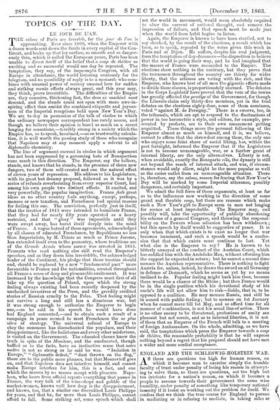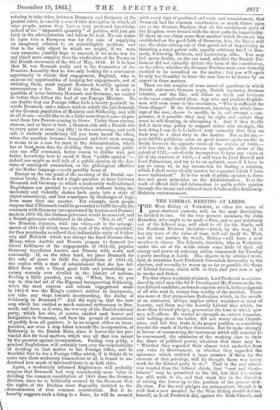ENGLAND AND THE SCHLESWIG-HOLSTEIN WAR.
AS there are questions too high for human reason, on which it becomes man to exercise simply the humble faculty of trust under penalty of losing his reason in attempt- ing to solve them, so there are questions, not too high but too intricate for a nation's reason, on which it becomes a people to assume towards their government the same wise humility, under penalty of something like temporary national insanity if it insist on working out the problem for itself. We confess that we think the true course for England to pursue in mediating or in refusing to mediate, in taking sides or refusing to take sides, between Denmark and Germany at the present crisis, is exactly a case of this description in which all -wise people, unless they have a very profound knowledge indeed of the "impossible quantity" of polities will just put faith in the administration and follow-its lead. No one wants -to lapse into a European war for the sake of supplying an imaginary solution to an unintelligible problem, and that is the only object in which we might, if we were very sanguine, possibly hope to succeed, if we make war for any object more complex than the vindication of the Treaty on the Danish succession of the 8th of May, 1852. If it be true that M. von Bismark really said to the Committee of the Prussian Assembly that he was only looking for a convenient opportunity to violate that engagement, England, who is anxious for opportunities of keeping her engagements, not of violating them, must support Denmark heartily against so unscrupulous a foe. But if this be false, if it is only a question of terms between Denmark and Germany, we cannot do better than follow the lead of our Foreign Minister. No one doubts that our Foreign Office feels a hearty goodwill to- wards Denmark, and a sincere wish to satisfy the just demands of the German population of Holstein and Schleswig, and will do all it can—would hlre to do a little more than it can—to pre- vent these two Powers coming to blows. Under these circum- stances, and as there is both a German side and a Danish side to every point at issue (say fifty) in the controversy, and each side is entirely satisfactory till you have heard the other, when the question becomes hampered and both seem wrong, it seems to us a case for trust in the Administration which has at least more data for deciding than any private politi- cian can well command, better reason to dislike war, and better knowledge how to avoid it than "public opinion "- indeed one might as well talk of a public opinion on the doc- trine of contingent remainders, or the philological affinities of the Berber language—could possibly boast of. Except on the one point of the meaning of the Danish suc- cession treaty, there is not a single question at issue between Denmark and Germany on which a moderately well-informed Englishman can pretend to a conviction without; being im- mediately and violently shaken back again into a state of abject uncertainty, and that sometimes by discharges of logic from more than one quarter. For example, most people suppose that if Denmark could be persuaded to fulfil literally the contracts with Germany (as represented byAustria and Prussia) made in 1851-52, the German grievance would be removed, and -a Danish grievance substituted in its place. "Not at all," cry the Prussian deputies with one voice,—it is the arrange- ments of 1851-52 which were the root of the whole mischief; for they practically sacrificed that indissoluble unity of Schles- wig and Holstein which was always the fixed German idea. Hence, when Austria and Prussia propose to demand the literal fulfilment of the engagements of 1851-52, popular Germany repudiates Austria and Prussia with scorn and contumely. If, on the other hand, we press Denmark for the sake of peace to fulfil the stipulations of 1851-52, she replies with a stare of astonishment that she has ful- filled them with a literal good faith and painstaking ac- curacy scarcely ever rivalled in the history of nations. Feeling a little puzzled, you ask, "What, then do you say to this last act of the Rigsraad incorporating then, -when the most express and solemn engagement made in 1851-2 was the King's contract neither to incorporate, nor take any steps towards incorporating, the duchy of 'Schleswig in Denmark ?" And the reply is that the new step which has excited so much national enthusiasm in Den- mark, and been, as it were, the war-cry of the Danish national party, which has also, of course, excited such horror and indignation in Germany, and been the ground of accusations of perfidy from all quarters, is in no respect either an incor- poration, nor even a step taken towards the incorporation, of Schleswig in the Danish State since it leaves her her pro- vincial diet for local matters, which was all that was meant by the promise against incorporation. Feeling very giddy, a prudent Englishman will certainly turn over the responsibility of deciding in that matter to the Foreign Office, and be thankful that he has a Foreign Office which, if it thinks fit to -enter into these mediatory transactions at all, is bound to un- derstand how much of falsehood there is on both sides.
• Again a moderately informed Englishman will probably suppose that Denmark had very considerably more voice in deciding the common constitution of 1855 than the German Duchies, since he is habitually assured by the Germans that the rights of the Duchies were flagrantly violated in the / determination of that common constitution. But if he humbly suggests such a thing to a Dane, he will be assured with every e of profound and even naïf astonishment, that Den m.trk had thecommon constitution as much thrust upon her as the German Duchies, that all the constituent parts of the kingdom were treated with the most pathetic impartiality. If there be one claim more than another which Denmark has established on the good faith of Germany, it is, the Danes will say, the claim arising out of that grand act of impartiality in thrustineb a royal patent with equally arbitrary hand on Den- mark, Sehlesxvie, Holstein, and Lauenburg, alike. You may feel grave doubts, on the one hand, whether the Danish Par- liament did not virtually dictate the form of the constitution, on the other, whether the German Duchies were over formally entitled to be consulted on the matter ; but you will again be only too thankful to leave the true line to be drawn by an expert in these matters.
These are but samples of some scores of questions in which Danish statement, German reply, Danish rejoinder, German rebutter, and the like, will follow as thick and intricate as the most complicated pleas. Any wise and prudent English- man will soon come to the conclusion, "Who is sufficient for these things ? If the Government, knowing the whole bear- ings of the case, choose to meddle in it, and attempt a com- promise, it is possible they may be right, and certain they must be self-denying, in attempting it. And if they finally feel it their true policy to support either side strongly, the best thing I can do is to believe very earnestly that they see their way to a clear duty in the matter. But as for me,— poor fallible politician even on great issues—quite unable to decide between the opposite views of the statute of 1460,— stilt less able to decide between the opposite views of the patent of 1721,—absolutely incompetent to form any views at all of the contract of 1851,-1 will trust in Lord Russell and Lord Palmerston, and try to be an optimist, even if I have to pay an extra 4d. in my income-tax for finding a solution, which I shall never clearly master, for a quarrel which I have never understood." It is the work of public opinion to force free and great principles on the Administration. It is the work of official skill and information to guide public opinion through the straits and eddies of such details as this Schleswig- Holstein embarrassment.



































 Previous page
Previous page